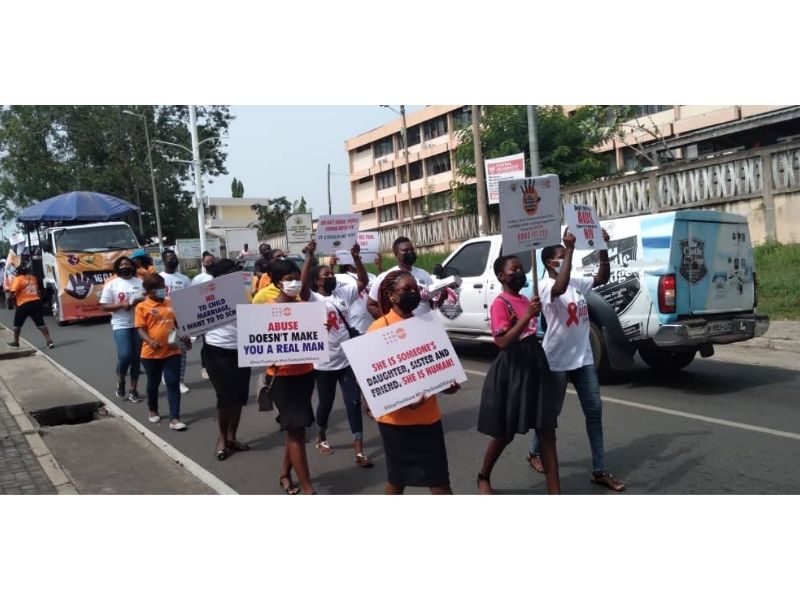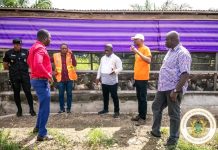
Religious leaders and social groups in the Volta Region have pledged their support to the Department of Gender and related organisations to educate the public on the effects of gender-based violence as well as child marriage.
The Volta Regional Chairman of the Christian Council of Ghana, Rev. Seth Mawutor, said no pastor in the region, or Ghana in general, approves of child marriage, adding that pastors officiate marriages more often, but not between children and adults.
Rev. Mawutor, who chaired a regional programme to commemorate 16 Days Activism Against Gender-Based Violence in the Volta Region, at the capital Ho, said the church still remained an institution of peace, and at all times ensure that education on issues of national interest were carried out.
He also expressed concern about widowhood, and reminded the Department of Gender to equally pay attention to the practice.
Rev. Mawutor further noted that as a pastor who performed these rites for widows, he had never performed such for men who lose their wives, which ought to be seen as gender-based discrimination.
The Christian Council Chairman used the occasion and admonished the youth to be of good behavior, and refrain from practices like early sex, which, he advised, would do them no good.
The Volta Regional Chief Imam, Alfa Anas Hamidu, also assured the public that Islamic religious practices despise violence, but rather promotes peace and the demonstration of love to one another.

Imam Hamidu said since gender violence was becoming a major threat in the nation, his office would ensure that Muslims would enjoy regular education on the need to live in peace with each other, and avoid gender violence.
According to the Chief Imam, the zongo community in Ho had never been involved in child marriage, but people continued to spread falsehood, which might be true, but that did not mean that such marriages were carried out by the Muslim community.
Imam Hamidu explained that child marriages were conducted in some Africa countries like Nigeria, and when the couples visit the Ho Zongo, they were welcomed as part of the community, and that the loving nature of Muslims made it impossible to reject them.
The Child Protection Officer of the United Nations Population Fund (UNFPA), Madam Cecilia Owusu, reiterated the commitment of her outfit to seeing to it that all harmful practices, including child marriage, were brought to an end.
Madam Owusu disclosed that in Ghana, one in five girls, aged between 20 to 24 years, were married before the age of 18, and while the prevalence of child marriage had declined over the past three decades, no significant progress was made in the region.
She observed that the key drivers of child marriage were identified to be multiple and multi-faceted and were linked to various socio-economic and cultural factors such as education, teenage pregnancy, and poverty.
The Volta Regional Director of the Department of Gender, Mrs. Thywill Eyra Kpe, said her outfit would pay more attention to young women to make them understand the challenges that they would face as teenage mothers, therefore, should protect themselves against early sexual activities that would destroy their future.

Mrs. Kpe made it clear that education on regular bases would be concentrated in the Junior High and Senior High Schools, as they would serve as ambassadors to educate their colleagues in their respective communities.
The Volta Regional Director of the Department of Children, Mr. Israel Akrobortu, appealed to the municipal and district assemblies in the region to consider making available 0.5 percent fund for the Department of Social Welfare to carry out regular educational programmes on negative practices like child marriage.
The Volta Regional Technical Officer on HIV, Mrs. Mary Ashilly, reminded the people to lead responsible sexual lives, because the spread of HIV was on the increase, saying the regional capital, Ho, leads with 109 new infections, followed by Kpando with 108, while the total reported new infections in the region stood at 800.
The Department of Gender, earlier organised a float through the principal streets of Ho to create awareness on the effects of gender-based violence in the region, and the country in general, bearing placards, some of which read: “Stop killing women,” “Enough is enough,” “Violence is perpetrated against boys too” among others.
Groups which pledged to work towards a reduction in gender-based violence and child marriage included Dressmakers Association, Hairdressers, and Christian Youth Association.









